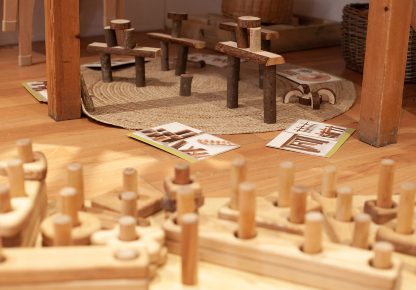The latest REF results rate Froebel Trust funded research highly, recognising Froebelian research projects as 'World-Leading' and 'Internationally Excellent'
What is REF 2021?
How do you know that universities’ research is any good? Every seven years the quality of research and its impact on society or the economy is assessed by ‘The REF’ - Research Excellence Framework.
It has 3 main aims:
- To provide accountability for public investment in research and produce evidence of the benefits of this investment.
- To provide benchmarking information and establish reputational yardsticks, for use within the HE sector and for public information.
- To inform the selective allocation of funding for research.
The REF is organised by the four UK higher education funding bodies: Research England, the Scottish Funding Council (SFC), the Higher Education Funding Council for Wales (HEFCW), and the Department for the Economy, Northern Ireland (DfE).
Research is judged by panels of experts in different subjects, ranging from Astrophysics to Zoology and everything in between, including Early Childhood Education.
What are the ratings?
The quality of research and impact are indicated by a star rating system:
4 stars for ‘World-Leading’ research
3 stars for work that is ‘Internationally Excellent’
2 stars for research that is ‘Recognised Internationally’
1 for work that is 'Recognised Nationally’
No stars for ‘Unclassified’ research that has not reached 1 star status.
Latest REF ratings for research about early childhood education
In May and June 2022, the results of the latest REF exercise were published. There were some fantastic ratings for Early Childhood Education; congratulations to everyone whose work contributed to the REF submissions and to those colleagues whose work surrounded and supported them.
The Froebel Trust was delighted to see that our funded research featured among publications and impact case studies, which were judged to be world-leading or internationally excellent. This work – across 4 institutions – was concerned with inclusion of children who had been identified as having Special Educational Needs and Disabilities (SEND); and education and care for the youngest children (Birth to 3).
The impact of Froebel Trust funded research on inclusion and SEND
Professor Sarah Parsons’ work at the University of Southampton, which focused on the co-construction of Digital Stories with young autistic children, parents and nursery staff, as the children prepare for transition to primary school.
This Froebel Trust funded research led to positive change in the practices of teachers in special and mainstream schools and early years settings - achieved with published articles (including - 2020 and 2020a) and CPD delivered via the Autism Community Research Network @ Southampton (ACoRNS). This impact was noted by Ofsted in its reports on two of the schools involved in the project which were judged to be ‘Outstanding’.
Professor Adam Ockelford’s research at the University of Roehampton, into the musical development of children across the spectrum of neurodiversity led to the development of the Sounds of Intent Framework. The Froebel Trust funded a PhD student, Dr Angela Voyajolu who worked with Professor Ockelford to examine emerging musicality in young children using the Framework. Their work, which has been published in journals and books, improved the educational progress of children with special educational needs in Early Years settings and special schools, and enhanced their learning experiences.
The impact of Froebel Trust funded research on babies and young children (birth to 3)
At Manchester Metropolitan University (MMU), a Froebel Trust-funded investigation of sensory-motor learning in two-year-olds contributed to MMU’s continuing programme of holistic findings to support multi-sensory and culturally-appropriate work with very young children. The study, which was led by Professor Maggie MacLure and Dr Christina MacRae led to changes in adult-child ‘attunement’ and documentation at home and in nursery. The research was shared in journal articles, as well as in practice guidance, a Froebel Trust webinar and an interview for Early Years TV.
Supporting infant and toddler educators to improve the experiences of the youngest children in Early Years settings was also the focus of research at Canterbury Christ Church University. The work by Professors Goouch and Powell led to changes in CPD policies in local authorities (LAs) in the UK; and East Sussex was awarded the 2019 Nursery World Award for Working with Babies & Toddlers. The collaborative work with LAs and practitioners on relationships and communication (including a study of singing which was funded by the Froebel Trust) also improved attunement in Baby Room practice with infants and toddlers and motivated new research and CPD initiatives and networks across England and internationally.
Explore our research library
We fund research into the learning and development of babies and young children.
Find out moreLooking for funding?
We are the only grant maker in England to fund research and practice development that is exclusively concerned with early childhood education and care. We fund high quality research which advances knowledge and understanding of Froebelian philosophy, principles and approaches in early childhood education and care.
Learn more

